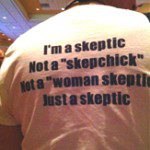 Picture an atheist. If you’re like most people, you’re probably picturing a middle-aged white guy complaining angrily about religion. Even if you are an atheist yourself, one who is neither white nor a guy nor angry, you still might picture that and think of yourself as an exception.
Picture an atheist. If you’re like most people, you’re probably picturing a middle-aged white guy complaining angrily about religion. Even if you are an atheist yourself, one who is neither white nor a guy nor angry, you still might picture that and think of yourself as an exception.
For years I fit that stereotype pretty well, and I still fit at least half of it. But most atheists don’t, and they often end up invisible, drowned out by the more aggressive voices.
Many people think of nonbelievers as hostile and unpleasant because they only see atheists when they are hostile and unpleasant. Conflict drives the news, so atheists are mostly in the public eye when they’re fighting against religious incursions into politics or the science classroom, or when they see religious ideas curtailing women’s reproductive rights, or denying kids health care, or fueling racism and homophobia, or any of a long list of other things that are pretty damn deserving of some anger.
But here’s the thing: If the only time you see atheists is when they’re angry about religion, it’s natural to think of atheists as cranky people who spend all of their time and energy opposing religion.
When’s the last time you saw an atheist who was in the news for alleviating poverty and suffering? I know a couple thousand of these through my work with Foundation Beyond Belief. What about those who build bridges with progressive believers, or even enjoy religious ritual themselves, even though they don’t believe? And what about those who are fully atheistic but simply don’t care a bit about religion OR about opposing it?
They’re out there in droves, but most of us never hear about them. They remain invisible, and the impression that there’s only one kind of atheist persists.
But it’s beginning to change. In the last few years, I’ve probably seen a dozen different ways of categorizing the different kinds of atheists, from my own description in Atheism For Dummies of the greater visibility of social justice and community among our concerns to the four types proposed by PZ Myers (scientific, philosophical, political, humanist) to as many as 42 categories in a blogpost I now can’t find to save my life.
I always find these things interesting. But every time someone proposes categories like this — EVERY time — somebody in the comments will sniff, “I don’t like labels. They divide people.” Or, “I’m an ATHEIST, period. I don’t need a hyphenation.”
No problem. If you don’t need a sub-category, don’t use one. But I get why some people find them so satisfying: because in some small way, it pulls off the invisibility cloak that denies who they are and how they are different, that subsumes them into the herd.
 When you hear someone complaining about “hyphenated Americans” — a complaint that goes back to the 1890s — you can
When you hear someone complaining about “hyphenated Americans” — a complaint that goes back to the 1890s — you can  be pretty confident that the speaker doesn’t feel invisible, and is comfortable being assimilated into the majority, and probably isn’t disadvantaged or denied privileges as a result.
be pretty confident that the speaker doesn’t feel invisible, and is comfortable being assimilated into the majority, and probably isn’t disadvantaged or denied privileges as a result.
The same thing pops up in freethought with “I’m not an ‘Atheist Plus,’ I’m just an atheist,” and “I’m not a ‘skepchick,’ not a ‘woman skeptic,’ just a skeptic.” There’s no problem nixing the modifiers, of course. But the implication is crystal clear: I’m not these things, and you shouldn’t be either. And once again, it’s usually coming from someone who doesn’t feel invisible, on the margins, unrepresented by the majority.
I know what it’s like to be on the margins. I’m an atheist, so I know how it feels to disappear into someone else’s assumption that I believe in their god, to feel the need to clarify who and what I really am. So in cases when I’m in the privileged default myself — cisgender, straight, white, etc. — I’m happy to let people describe themselves in whatever way they wish, even if I don’t get it. They known better than I do what’s important to them.
That’s why uncovering the invisible atheists, the ones who don’t feel represented by default assumptions about atheism, is worth doing. As a nice by-product, it can show the millions of closeted atheists who don’t match the public face of atheism that yes, there IS a place for them to stand.














